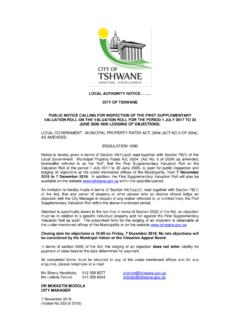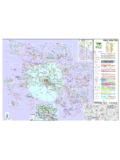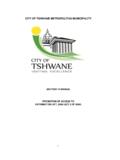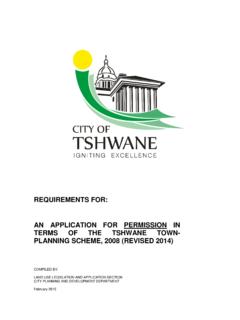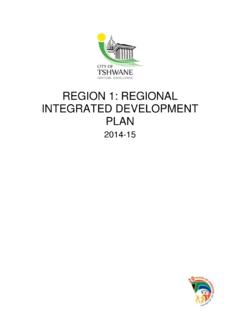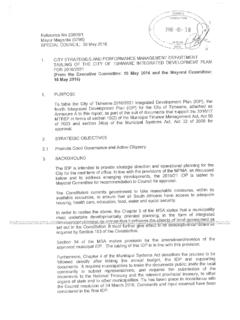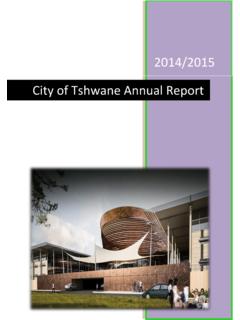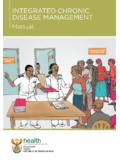Transcription of COVID 19 CONTINGENCY PLAN 2020 - tshwane.gov.za
1 RESTRICTED 01 April 2020 Phase 2 1 CITY OF TSHWANE COVID 19 CONTINGENCY PLAN 2020 RESTRICTED 01 April 2020 Phase 2 2 Document Information Document Type CONTINGENCY Plan Applicability CONTINGENCY plan in the event of COVID 19 outbreak to reduce social and economic impact. Annexures to this plan A: Emergency Contact List B: City of Tshwane Needs List C: Identified quarantine/isolation sites D: Homeless spread prevention plan Reference 1. Constitution of the Republic of South Africa Act 108 of 1996 2. Disaster Management Act 57 of 2002 3.
2 National Disaster Management Framework of 2005 4. Fire Brigade Services Act 99 of 1987 5. gauteng Ambulance Services Act 6 of 2002 6. Occupational health and Safety Act 85 of 1993 as amended read with the Hazardous Biological Agents Regulations 7. The National health Act, Act No 61 of 2003 1. EPI disease surveillance guideline 3rd ed 2015 2. National guidelines on epidemic preparedness and response 2009 3. Disposal of the diseased guidelines. 4. Regulations Relating to the Management of Human Remains, Regulation No. R. 363 of 22 May 2013 as framed in terms of the National health Act, 2003 (act No. 61 of 2003). 8. CoT Disaster Management Plan 9.
3 Standard Operating Procedures 10. Guidelines and regulations RESTRICTED 01 April 2020 Phase 2 3 11. INTRODUCTION AND RATIONALE On 31 December 2019, the World health Organization (WHO) China Country Office was informed of cases of pneumonia of unknown cause detected in Wuhan City, Hubei Province of China. On 7 January 2020, the causative pathogen was identified as novel coronavirus (2019-nCoV). Several other cities in China and other countries have also reported cases. The majorities of cases were linked to a seafood, poultry and live wildlife market in Wuhan City. The World health Organisation declared a global pandemic as the coronavirus spread across the world.
4 On 15 March 2020 the President of the Republic of South Africa declared Covid19 a National Disaster and announced various measures to be implemented. The City of Tshwane implemented various measures prior to the announcement of a pandemic or the declaration of a disaster by the President. The following measure were implemented by the City of Tshwane: 1. Activation of the Disaster Management Centre (Level 3) which has since been changed Level 1 where the City s Executive Management lead the implementation and enforcement of the extraordinary measures announced by the President to prevent the spread of the virus 12. Identifying various city departments to develop preparedness an response plans 13.
5 Conduct various awareness sessions with city employees and city role players This plan provides consolidated guidance to municipal sector departments and other agencies within the City of Tshwane with a general concept of potential emergency assignments to prevent the spread of the virus. Due to the complexity of the virus this plan be seen as a living document that will be updated continuously as more information and data are made available. RESTRICTED 01 April 2020 Phase 2 4 This plan is in line with Standard Operation Procedures for preparedness, detection and response to a coronavirus (2019-NCOV) outbreak in South Africa as well as the Interim guidance from World health Organisation.
6 The custodian of this plan vests with the Chief of Emergency Services (CoE) where in the absence of the Chief of Emergency Services during the period in which this plan remains in force; the delegation of executive authority and chain of succession in a major on-site emergency or disaster is as follows 1. Divisional Chief: Fire & Rescue Operations (or person acting in the capacity) 2. Divisional Chief: Emergency Medical Operations (or person acting in the capacity) 3. Divisional Chief: Business Operations (or person acting in the capacity) In recognition of the emergency and disaster management responsibilities of the City of Tshwane government and with the authority vested in me as the Chief of Emergency Services for the City of Tshwane under Fire Brigade Services Act (Act No.)
7 99 of 1987) and the Disaster Management Act (Act No. 57 of 2002, I hereby affirm this City of Tshwane Emergency Operations Plan for Coronavirus ( COVID 19). RESTRICTED 01 April 2020 Phase 2 5 R e c o r d o f D i s t r i b u t i o n # Office/Department Representative Signature 1 Office of the City Manager Mr. Msizi Myeza Tel: 012 358 4901/4 Cell: 072 985 9800 2 CoT Chief Operations Officer Mr James Murphy Tel: 012 358 5605 Cell: 082 467 9283 3 Governance & Support Officer Me Lorette Tredoux Tel: 012 358 4050 Cell: 078 451 4894 4 National Disaster Management Centre Dr Mmamphaka Tau Tel: 012 848 4619 Cell: 082 052 9311 5 Provincial Disaster Management Centre Dr.
8 Elias Sithole Tel: 011 355 4018 Cell: 082 490 9825 6 Chief of Tshwane Metro Police Ms Johanna Nkomo Tel: 012 358 4954 Cell: 082 466 6846 7 Group Head health Mr Koena Nkoko Tel: 012 358 4586 Cell: 082 433 1332 RESTRICTED 01 April 2020 Phase 2 6 D e f i n i t i o n s a n d A b b r e v i a t i o n s City of Tshwane [CoT] means the City of Tshwane Metropolitan Municipality. City Manager means the person appointed as the Municipal Manager of the City of Tshwane Metropolitan Municipality in terms of Section 82 of the Local Government: Municipal Structures Act. Command Centre - means the City of Tshwane Disaster and Emergency Management Central Command Centre which is physical location responsible for responsible for carrying out the principles of emergency preparedness and emergency management, or disaster management functions at a tactical and strategic level during an emergency or disaster in order to ensure continuity of operations, services, and/or municipal government.
9 Coordination - is the process of systematically analyzing a situation, developing relevant information, and informing appropriate personnel of viable alternatives for selection of the most effective combination of available resources to meet specific objectives. (See Operational Coordination) Chief of Emergency means the Chief of the City of Tshwane Emergency Services Department who as the appointed Chief Fire Officer under Section 5 (1) of the Fire Brigade Services Act and Head of Municipal Disaster Management Centre under Section 45 (1) of the Disaster Management Act is responsible for managing the development and coordination of disaster and emergency management plans, disaster and emergency response and coordination, and is the liaison with provincial and national disaster management and fire services authorities.
10 Disaster: means a progressive or sudden, widespread or localised, natural or human-caused occurrence which causes or threatens to cause- (i) death, injury or disease; (ii) damage to property, infrastructure or the environment; or (iii) disruption of the life of a community; and (b) is of a magnitude that exceeds the ability of those affected by the disaster to RESTRICTED 01 April 2020 Phase 2 2 cope with its effects using only their own resources Disaster management - means a continuous and integrated multi-sectoral, multi-disciplinary process of planning and implementation of measures aimed at preventing or reducing the risk of disasters; mitigating the severity or consequences of disasters; emergency preparedness; a rapid and effective response to disasters; and post-disaster recovery and rehabilitation.
